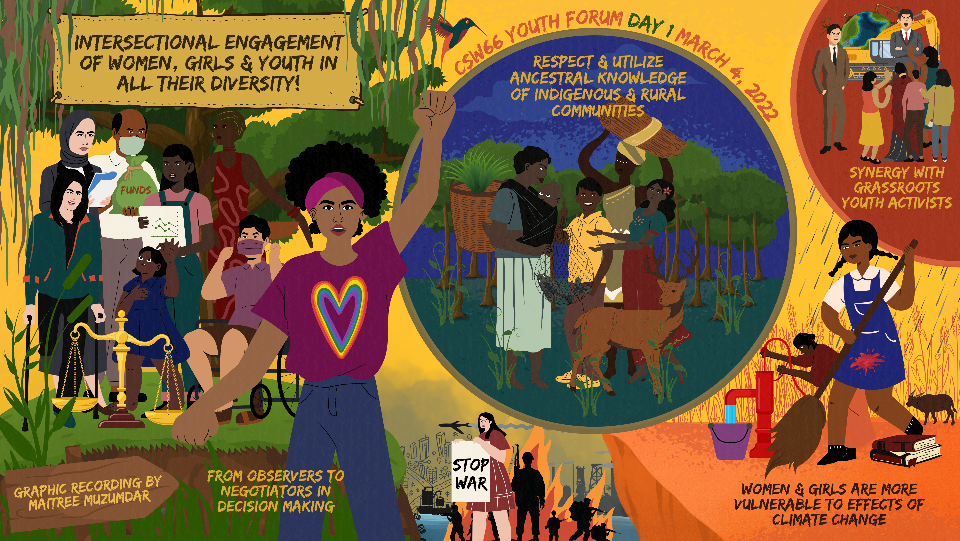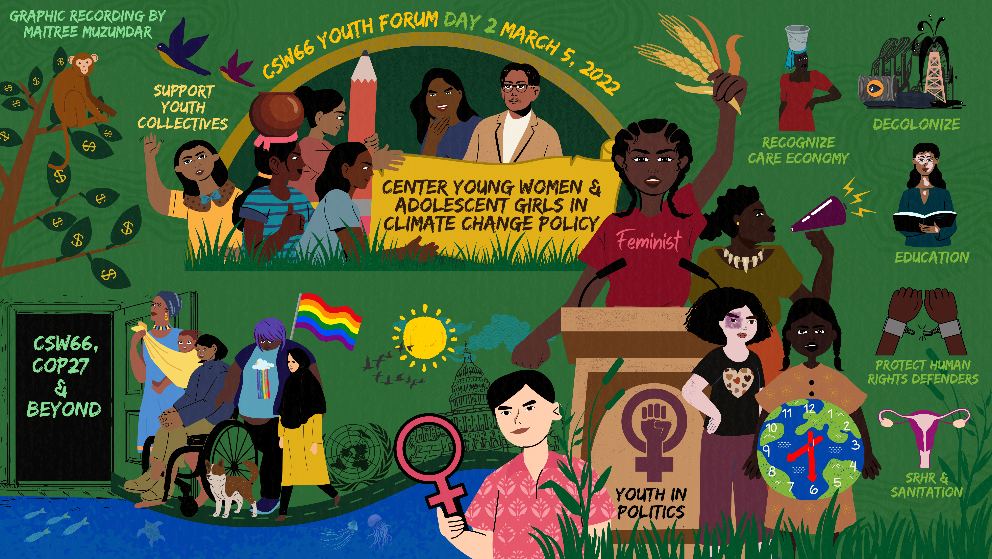Young women, girls, and youth in all their diversity, are the key to climate action. This was the theme for the CSW66 Youth Forum, held virtually on March 4th and 5th ahead of the 66th session of the Commission on the Status of Women. A gathering of global youth and decision makers, the Youth Forum was an opportunity to connect, converse, and reflect on the impacts of the climate crisis in the context of gender equality and its profound impacts on youth. The Global Youth Recommendations: Youth, Gender, and Climate Change, supported by over thirty grassroots consultations from all regions, were presented at the Forum as an agreed road map for climate justice.
The first day of the Youth Forum allowed for unique intergenerational conversations, during which UN Women Executive Director Sima Bahous, the Chair of CSW Mathu Joyini, the UN Youth Envoy Jayathma Wickramanayake, and Permanent Representatives to the UN, and civil society acknowledged the crucial role youth play in advancing the climate action agenda.

The CSW66 Youth Forum explored the importance of centering underrepresented and most affected communities in decision making spaces. Archana Soreng from MAKAAM Mahila Kisan Adhikaar Manch India and Member of the UN Secretary General’s Youth Advisory Group on Climate Change, highlighted the role that indigenous women have in “protecting the fragile territories in which they live and as crucial transmitters of knowledge related to sustainable environmental management.”
The adolescent activist from Chile, Isidora Guzmán, focused her intervention on how neutral policies perpetuate eco-ableism and impede “people with disabilities from being part of the solution to achieving climate justice”.
The second day of the Youth Forum offered a dynamic and intersectional platform for discussions, with a focus on sharing experiences and collectively endorsing the Global Youth Recommendations. Speakers were able to present their opinions from an intergenerational and intersectional perspective and agreed that youth-led arenas are essential to drive forward feminist action for climate justice.

Artivism was a key component too, allowing the powerful messages of the Forum to be communicated through the universal language of performative art, expression and dance. The key points of the Youth Forum were captured through a graphic recording created by young artist Maitree Muzumdar.
The Forum convened over 1700 participants, inspiring and raising awareness through actions to tackle the effects of climate changes from a feminist perspective.
Youth-led Consultations ahead of CSW66
Young people are at the frontlines of the fight against climate change as they will be most impacted by the extensive and irreversible impacts. Despite the pressing nature of this issue, the knowledge and lived experiences of young people are often overlooked in the process of finding solutions to climate change. In order to make sure voices of young people are heard in negotiations at the 66th session of the Commission on the Status of Women, young people and adolescents from different parts of the world carried out more than 30 community-level, youth-led consultations collecting recommendations on climate justice from 1500+ youth.
The consultations across 6 regions (North America, Latin America and the Caribbean, Europe and Central Asia, Africa, Middle East and North Africa (MENA), Asia and the Pacific regions) offered an opportunity for young people and adolescents to have productive dialogues about Climate Change and environmental disaster risk reduction, its impact on youth, and identify areas for policy development and risk reduction. These regional and grassroots community conversations were led and facilitated by youth. The outcomes of these community-level consultations contributed to the key messages and recommendations from youth that informed a set of practical recommendations for a youth centric, holistic, and integrated climate change strategy. The recommendations were also shared with Members States to inform their deliberations around the CSW66 Agreed Conclusions.
